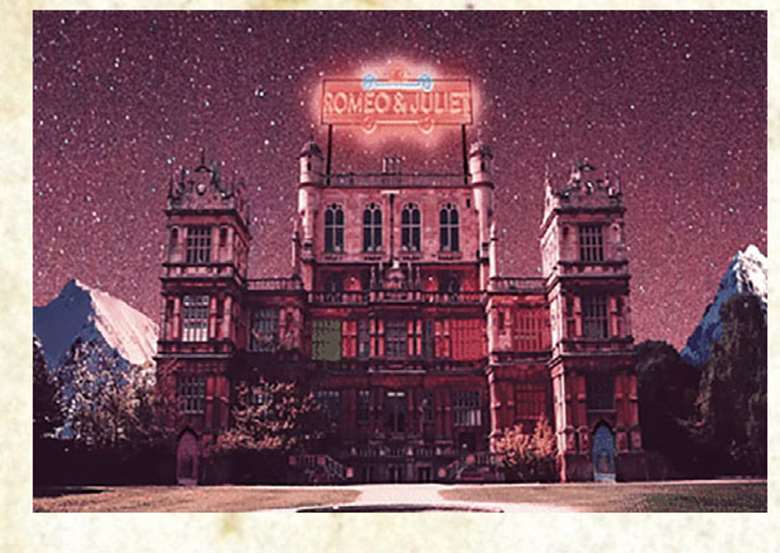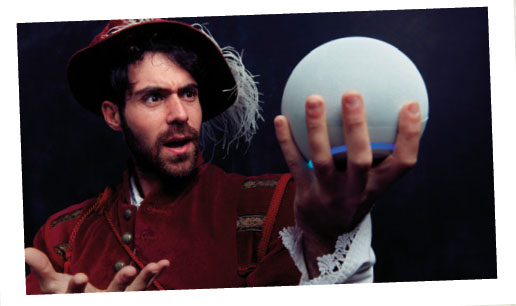Bardwatching: Creation Theatre's Romeo & Juliet; Amazon's Alexa; Michael Blanding's findings
Sarah Lambie
Saturday, May 1, 2021
When it comes to the Bard, she's an inveterate twitcher. Sarah Lambie shares what she's spotted through her beady bardy binoculars.

Now the two hours’ traffic of our stage…
Creation Theatre has partnered with Watford Palace Theatre to deliver a multi-platform digital performance of Romeo & Juliet this May, directed by Natasha Rickman, artistic associate at the Jermyn Street Theatre.
Audience members will find themselves at a Capulet party, and will have to ‘choose their own adventure’, with a mix of live performance and prefilmed scenes. This will be Creation Theatre's 9th online production, but the first that utilises multiple digital platforms.
Among the 13-strong cast is RSC associate artist Katy Stephens, who has starred in a huge number of leading Shakespearian roles at Shakespeare's Globe and the RSC.
Rickman has said ‘Digital theatre is now its own art form. The multiverse format is so freeing and the fact that our actors can perform multiple versions of scenes which can be viewed simultaneously by people all over the world is hugely exciting. Plus, for this special production we have amassed a hugely talented cast, which includes some of the UK's leading Shakespearean actors.’
Brigid Larmour, Watford Palace Theatre's artistic director, added: ‘WPT is thrilled to be partnering with Creation Theatre on this timely, accessible, and inventive production - a truly interactive digital show. Since lockdown began, we've been reaching out to collaborate with other companies and artists in our region digitally and – like theatre makers across the country – respond to the challenge in creative new ways. We can't wait for audiences and families to immerse themselves in this exciting reimagining of Shakespeare's classic love story!’
The performances will run between 12-23 May, with a total of 10 shows performed live on Zoom. Tickets cost £20, and booking details can be found at www.creationtheatre.co.uk/whats-on/romeo-juliet
This fellow's wise enough to play the fool…

April is the Bard-est month (with apologies to TS Eliot), with a major uplift in Shakespeare-related news and events surrounding his assumed birthday and known death day – 23 April. This year has been no exception, and the range of celebratory silliness included an update to Amazon's Alexa, meaning that the virtual assistant can now be asked to recite a sonnet, a soliloquy or offer up a choice Shakespearean insult.
Amazon also conducted a survey of 2,000 Brits, finding that we use an average of 83 ‘Shakespearean’ phrases each month: a sign of the power of education given that 47% of the same 2,000 people claim not to have read any Shakespeare since leaving school or university.
The Bard of Avon is of course credited with a number of neologisms to which he can't with real evidence lay claim, since it is considerably more likely that his prolific and widely-read output is merely the earliest written record of words which were nonetheless being used verbally or even written down in sources now lost to us. It is, nonetheless, fun to remember that some of our most commonly-used phrases come from our society's historical consumption of Shakespeare: ‘for goodness’ sake’, for example, from Hamlet, and ‘what's done is done’ from Macbeth.
In other April Shakespeare frolics, D&T very much enjoyed the April Fool published across the pond by American Theatre under the title ‘Scholar Uncovers Shakespeare ‘Quarantine’ Sonnet’, featuring the glorious claim that ‘The fragment was found tucked inside the ear trumpet of a traveling [sic] player of the Jacobean period, Quincy Cheeves,’ and even more glorious piece of faux-sonnet writing:
‘When all Life's shrunk unto a Chamber's spanne, And Brothers meet as Strangeres, Friend as Foe, Suspicious glances pass ‘twixt Man and Man, For who beares Death-sweete Breath there's Nonne can know’
So good it's almost believable… though the line about ‘a Dearth of privie grass’ was a step too far!
They say best men are moulded out of faults…
In Bardwatching's continuing quest to report on the endless stream of scholarly postulations regarding authorship, we must touch on a book published at the end of March by journalist Michael Blanding: North by Shakespeare: A Rogue Scholar's Quest for the Truth Behind the Bard's Work.
This latest theory is perhaps less punchily controversial than the ones which claim William Shakespeare didn't write ‘his’ plays at all. According to self-taught scholar Dennis McCarthy, on whose research Blanding's book is based, Elizabethan courtier Sir Thomas North wrote source-plays which Shakespeare adapted into the works we know. Evidence for this ranges from similarity of word-use as discovered using anti-plagiarism software, to the analysis of payments made to North's older brother which coincide with the first productions of Shakespeare's plays. It's met, as always, mixed academic response, but all conjecture is interesting to the ‘twitchers’ among us. www.hachettebooks.com

